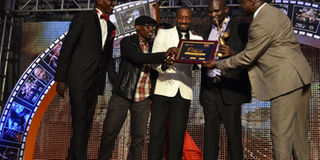Another Ugandan ventures into fiction

Dilman Dila (2ndR) and his cast receive the award for Best Feature Film at the 2014 Uganda Film Festival awards at Serena Kampala Hotel recently. Photo BY Michael kakumirizi.
What you need to know:
The last 15 or so months have been sweet ones for Ugandan writer Dilman Dila. From having his short story A Killing in the Sun nominated for the Commonwealth short story contest last year, to having his movie The Felistas Fable sweeping the Uganda Film Festival Awards gala a few weeks ago, It has been a great time for the writer.
Can you, as the writer, describe this collection of short stories in terms of genre?
It is speculative fiction, a broad literary genre encompassing any fiction with supernatural, fantastical, or futuristic elements, and this includes science fiction, fantasy horror... Most of the stories in it though are science fiction (sci-fi).
By all measures, science fiction set in Uganda is an entirely new concept. Tell us exactly what sort of characters and world you created in there.
I have in there some aliens from outer space, there are Genetically-modified Organisms (GMOs) bringing about strange and disastrous events in people’s lives I also have a futuristic Africa where technology has brought dark forces to control people’s lives, then people facing an apocalypse of sorts because science has gone wrong…
How did you get to settle on creating fiction in this genre which is scarce in Uganda and Africa?
I don’t think the genre is really scarce in Uganda or Africa. Only it’s always been around primarily in the oral and not the written form.
I was exposed to this kind of fiction very early in the folk tales, and it stuck with me as I grew up. Since I lived in a town with a lot of Swahili culture in it, I grew up with stories like those of jinnis and flying carpets and inter-world travel.
How long did it take you to write this collection of short stories?
About 13 years. I wrote the eponymous story (A Killing In The Sun) in 2001, while I wrote the last story last year. But I didn’t really set out to write a short story collection. I just found that I had written so many stories over the years and they could make a collection, so I sent them to a prospective publisher who accepted them.
You are a prose fiction writer, film maker, and what else? Isn’t it hard juggling between the different mediums?
It’s not difficult, because at the end of the day it is simply telling a story. The different formats have different rules and guidelines, but once you master the fundamentals of storytelling you find it is the same in all different kinds of media.
When did you start writing? What exactly inspired you into writing?
I started around my S.3. I was reading a lot of novels instead of revising my classwork, and I found myself beginning to write my own stories.
Which writers have inspired you in craft and in life?
I don’t have writers that I seek to emulate because my favourite writers keep changing as frequently as I read books.
But those I have read a lot, and whose books I will give priority to include Stephen King, Octavia Butler, Margaret Atwood, Amos Tutuola, Nnedi Okorafor, and Richard Laymon. But really I read anything and any writer I come across.
Do you write for a living?
Yes, I live as a writer. Not yet in prose, but most of my earnings come from film, which is one of the most commercialized art industries in Uganda.
What are the major messages you always look to communicate?
I don’t have any particular messages; they change from story to story, and will always be something that I have a personal history with.
What’s your take on Ugandan writing today?
Writing in Uganda is improving, and with many publishing houses and internet based platforms cropping up, many writers are gaining more confidence to put out their work.
There is still a long way to go to make writing a profitable business, but we are getting there.




